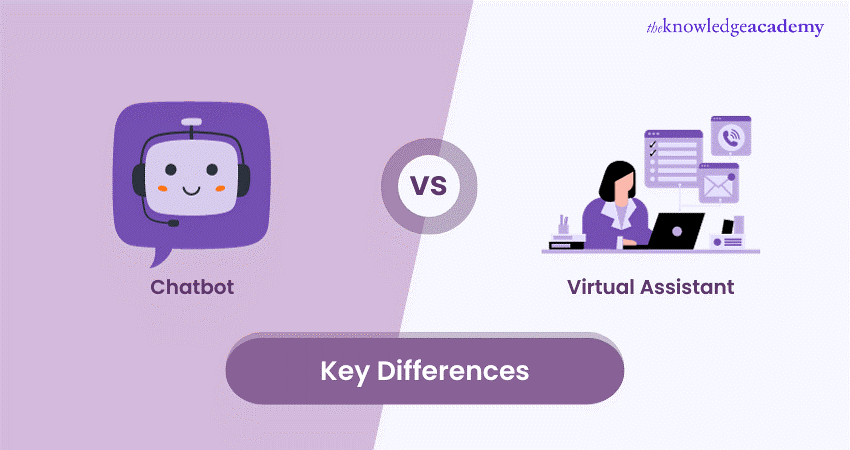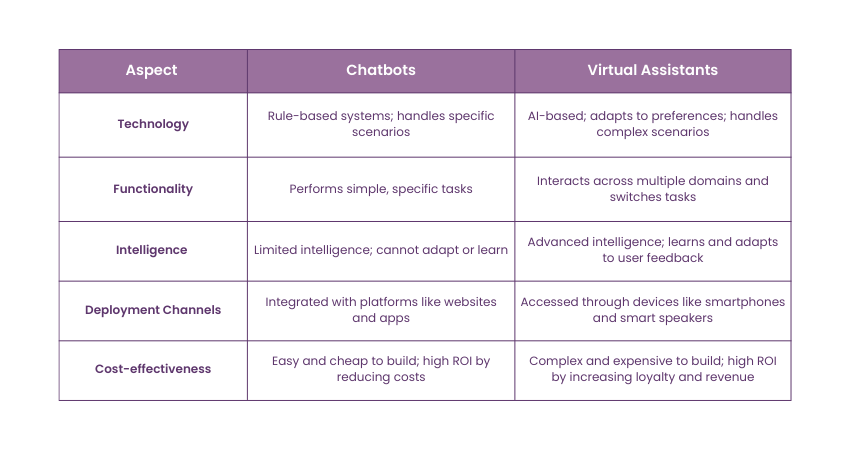We may not have the course you’re looking for. If you enquire or give us a call on +44 1344 203 999 and speak to our training experts, we may still be able to help with your training requirements.
Training Outcomes Within Your Budget!
We ensure quality, budget-alignment, and timely delivery by our expert instructors.

In modern technology the question Chatbot vs Virtual Assistant is quite the question that gets the spark. They could be overlapping functions of the same tool, or they could be utterly distinct and completely unrelated. Chatbots are the articulate hussies, utterly fast when it comes to answering questions and responding to work.
However, Virtual Assistant devices extend further than this—they are virtual companions in a way, who can order schedules, suggest and learn according to your personality with a pinch of artificial intelligence.
But where are they different and how are they the same and where do their two roads meet? This blog goes back to the fundamentals of Chatbot vs Virtual Assistant, dissecting the differences in the abilities that define each conversation partner. It may sound cliche to say, but knowing their roles may alter how you approach the emerging digital world if you are in a business or have an interest in technology.
Table of Contents
1) What is a Chatbot?
2) What is a Virtual Assistant?
3) Chatbot vs Virtual Assistant: Key Differences
4) Chatbot or Virtual Assistant: Which is Better?
5) The Future of AI Assistants
6) Conclusion
What is a Chatbot?
A chatbot is a script-assisted, AI, system designed to replicate natural human conversation on text or voice. Basically, it might be considered as a computer program designed to interact with end users, to help them get answers to some questions, to get information or to help the users to perform a task or tasks, but usually within a limited range of possibilities or scenarios.
Most Chatbots can be integrated with websites, social media and messaging platforms or used standalone in responding to common customer questions about their orders or to general inquiries, problems, and so on.
While simple Chatbots normally run on if-then-else type mode, smart ones can take advantage of natural language processing (NLP) to determine context and intent as well as hold simple conversions. Chatbots are in fact the attendants of the digital interaction world – quick, disciplined and always on the alert.
What is a Virtual Assistant?
Virtual assistant is often defined as a smart human-like interface for a complex system intended for executing a vast number of task-oriented activities beyond simple dialogues. While Chatbots are application program interfaces designed to simulate human conversation with users.
Virtual Assistants are created to perform tasks that range from acting as a digital assistant to an individual capable of accepting and performing complicated tasks like scheduling, reminder setting, emails and smart devices commanding.
With the enhanced NLP and ML, users of Virtual Assistants such as Siri, Alexa or Google Assistant can get well acquainted with peculiarities of their users and gradually replicate more and more realistic conversation. These types of bots are useful assistants, that can predict the user’s needs and give suggestions and are designed to easily fit into everyday life to add time efficiency and comfort.
Master the skills and succeed in online business by pursuing our Online Teacher Training – Sign up today!
Chatbot vs Virtual Assistant: Key Differences
Although Chatbots and Virtual Assistants are both types of conversational AI, they have some significant differences in terms of technology, functionality, intelligence, deployment channels, and cost-effectiveness. Here are some of the top key differences between Chatbots and Virtual Assistants:
1) Technology
Chatbots work through rules or scripts to answer queries, sometimes with the help of additional machine learning or natural language processing. But they can only work according to defined patterns and fail to automate advanced or unclear queries because of the fixed rules and data.
The Virtual Assistants, which are based AI and cognitive computing, have an advantage when it comes to responding to compound operations through use of natural language processing. Unlike traditional text editors, both Machine learning and NLP can change their working patterns based on feedback and data.
2) Functionality
Chatbots are designed for specific purposes, such as customer service, e-commerce, booking, or entertainment. Chatbots can only perform simple tasks, such as answering questions, providing information, or performing actions. Chatbots can only interact with users within a predefined scope or domain, and they cannot switch between different tasks or domains.
Virtual Assistants are designed for general purposes, such as personal assistance, productivity, or entertainment. Virtual Assistants can interact with users across multiple domains and switch between different tasks or domains.
3) Intelligence
Previous models of Chatbots are not very intelligent; they answer queries competitively according to a flowchart rather differently from intelligent systems that could learn user preferences. They are unable to recognise multi-turn conversations or even create user engagement that stretches over time.
Smart Virtual Assistants are proficient in whole-spectrum natural language processing (NLP) apart from acting as intelligent assistants. They learn from the feedback and data, are inclined to manage complex dialogues containing multiple turns, and can build long-term relationships with the users, that is why they can be considered as rather sufficiently universal and focused on users.
4) Deployment Channels
Chatbots work perfectly fine with websites and applications as well as social media platforms to reach out to different people and audiences. They also make it possible for users to have a similar experience when interacting with a given firm’s or organisation’s channels.
Virtual Assistants act on computers, mobile phones, and tablets, as well as smart speakers, providing targeted and easy-to-use experiences. They leverage on the device features to present a rich Multi Modal Inter-Action presentation depending on the situation of the user.
5) Cost-effectiveness
Chatbots are more affordable and easier to create than most human-AI interfaces, and they don’t need much data or prior knowledge. They reveal high returns on investment by cutting operation expenses, increasing customer satisfaction, and producing leads and sales.
Virtual Assistants are also rather sophisticated and cost-wise more expensive to create as they are based upon the higher levels of data and technologies; at the same time, they are also able to offer high ROI. They help increase customer satisfaction, loyalty, and word of mouth and drive new sources of revenue and intelligence.
Here's a table summarising the key differences between Chatbots and Virtual Assistants:

Unlock your online job opportunities with our Virtual Salesperson Training – Join today!
Chatbot or Virtual Assistant: Which is the Better Choice?
The answer to this question depends on your business goals, needs, and budget. Chatbots and Virtual Assistants have their own advantages and disadvantages, and they can serve different purposes and audiences. Therefore, you should consider the following factors before choosing between Chatbots and Virtual Assistants:
a) The scope and complexity of the tasks or commands you want to automate or facilitate
b) The level of intelligence and personalisation you want to provide to your users
c) The platforms or devices you want to integrate or access your conversational AI application
d) The amount of data, technology, and expertise you have or need to build and maintain your conversational AI application
e) The cost and benefit analysis of your conversational AI application
Use Cases and Industries
AI Chatbots and Virtual Assistants have disruptive technologies that have made considerable impacts on various industries. Here’s a breakdown of their use cases:
a) E-Commerce: Chabots help users in their purchase funnel by assisting, answering queries, understanding product availability, and suggesting products.
b) Healthcare: Some of the benefits of the Chatbots include; appointment scheduling, patient inquiries, availing the user to a doctor and physician. Health monitoring and timely reminders for taking different medications.
c) Travel and Hospitality: Chatbots are used to make flights, accommodation, renting a car arrangement and even design a guest’s bespoke schedule.
d) Marketing and Sales: Chatbots are used to create leads, to take feedback and to directly converse with customers for sale while Virtual Assistants are to analyse data for further processing.
e) Smart Home Management: They control Smart devices, Schedule and Personal assistance and Real-time information such as weather & breaking news.
f) Education: Virtual assistants are talented in providing a tailored form of learning help as well as most of the time help with scheduling and instant help with educational materials.
The Future of AI Assistants
Smart assistants are becoming better and more advanced and are set to evaporate the existing barriers between man and machine. With time, artificial intelligence (AI) will be able to understand facets such as contexts and emotions and even infare from body language since the AI will be learning, making the interactions feel natural.
The following are some of the key points:
a) Enhanced Human-like Interactions: With advancements in natural language processing (NLP) and machine learning (ML), AI assistants will better understand context, emotions, and unspoken cues, leading to more natural and intuitive interactions.
b) Proactive Assistance: AI assistants will shift from merely reacting to tasks to becoming proactive partners, anticipating user needs and providing personalised solutions.
c) Seamless Integration: They will seamlessly integrate across various devices, platforms, and ecosystems, ensuring a consistent and connected user experience (UX).
d) Role in Emerging Technologies: By integrating with augmented reality (AR) and the Internet of Things (IoT), AI assistants will broaden their applications in smart homes, workplaces, and beyond.
e) Impact on Key Sectors: AI assistants will revolutionise industries such as healthcare, education, and business by enhancing productivity, convenience, and personalised support.
Conclusion
Chatbots and Virtual Assistants are two popular types of conversational AI applications. It can help businesses enhance Customer Experience (CX), increase efficiency, and reduce costs. However, they are not the same, and they have some key differences in terms of technology, functionality, intelligence, deployment channels, and cost-effectiveness. Therefore, you should understand Chatbot vs Virtual Assistant and their differences and choose the best option for your business needs.
Master the skills to become a Virtual Assistant with our Virtual Assistant Course – Sign up today!
Frequently Asked Questions

Yes, Chatbots and Virtual Assistants can complement each other. Chatbots handle simple, repetitive tasks, while Virtual Assistants manage complex, personalised interactions. Together, they provide a seamless user experience, optimising efficiency and enhancing customer satisfaction.

Chatbots and Virtual Assistants are evolving with advancements in AI, Machine Learning, and Natural Language Processing. They are becoming more intuitive, capable of understanding context, handling complex tasks, and learning from user interactions, leading to more personalised and efficient user experiences.

The Knowledge Academy takes global learning to new heights, offering over 30,000 online courses across 490+ locations in 220 countries. This expansive reach ensures accessibility and convenience for learners worldwide.
Alongside our diverse Online Course Catalogue, encompassing 17 major categories, we go the extra mile by providing a plethora of free educational Online Resources like News updates, Blogs, videos, webinars, and interview questions. Tailoring learning experiences further, professionals can maximise value with customisable Course Bundles of TKA.

The Knowledge Academy’s Knowledge Pass, a prepaid voucher, adds another layer of flexibility, allowing course bookings over a 12-month period. Join us on a journey where education knows no bounds.

The Knowledge Academy offers various Virtual Online Job Roles Training Courses, including the Online Jobs Foundation. These courses cater to different skill levels, providing comprehensive insights into Virtual Team Building Activities.
Our Business Skills Blogs cover a range of topics related to online businesses, offering valuable resources, best practices, and industry insights. Whether you are a beginner or looking to advance your Business skills, The Knowledge Academy's diverse courses and informative blogs have you covered.







 Top Rated Course
Top Rated Course




 If you wish to make any changes to your course, please
If you wish to make any changes to your course, please


